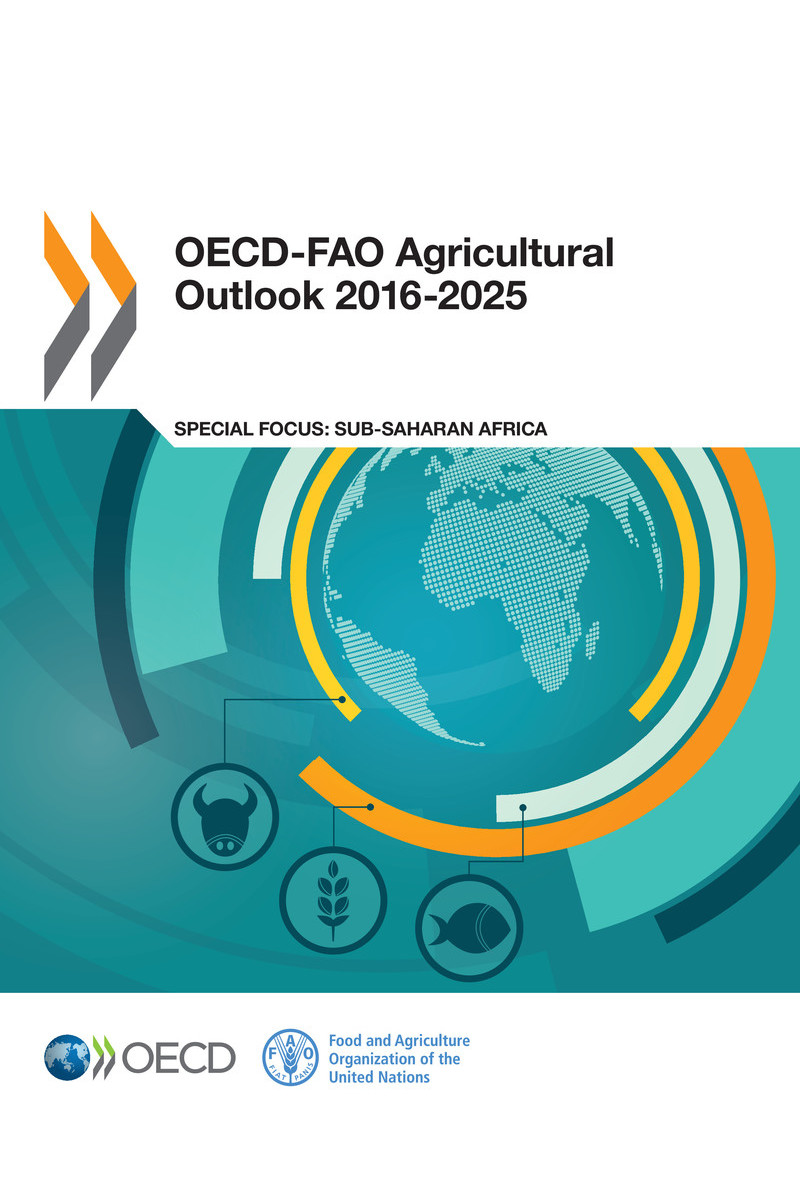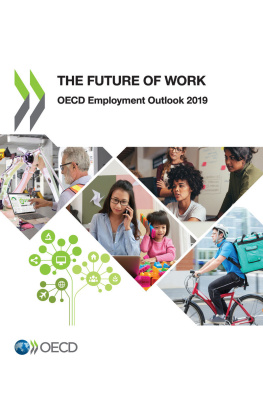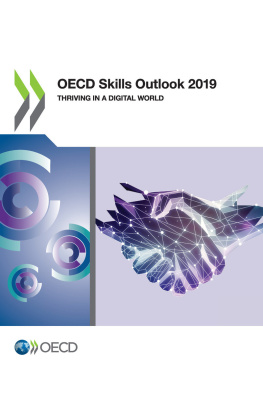OECD - OECD-FAO Agricultural Outlook 2016-2025
Here you can read online OECD - OECD-FAO Agricultural Outlook 2016-2025 full text of the book (entire story) in english for free. Download pdf and epub, get meaning, cover and reviews about this ebook. year: 2016, publisher: OECD Publishing, genre: Politics. Description of the work, (preface) as well as reviews are available. Best literature library LitArk.com created for fans of good reading and offers a wide selection of genres:
Romance novel
Science fiction
Adventure
Detective
Science
History
Home and family
Prose
Art
Politics
Computer
Non-fiction
Religion
Business
Children
Humor
Choose a favorite category and find really read worthwhile books. Enjoy immersion in the world of imagination, feel the emotions of the characters or learn something new for yourself, make an fascinating discovery.

OECD-FAO Agricultural Outlook 2016-2025: summary, description and annotation
We offer to read an annotation, description, summary or preface (depends on what the author of the book "OECD-FAO Agricultural Outlook 2016-2025" wrote himself). If you haven't found the necessary information about the book — write in the comments, we will try to find it.
OECD: author's other books
Who wrote OECD-FAO Agricultural Outlook 2016-2025? Find out the surname, the name of the author of the book and a list of all author's works by series.
OECD-FAO Agricultural Outlook 2016-2025 — read online for free the complete book (whole text) full work
Below is the text of the book, divided by pages. System saving the place of the last page read, allows you to conveniently read the book "OECD-FAO Agricultural Outlook 2016-2025" online for free, without having to search again every time where you left off. Put a bookmark, and you can go to the page where you finished reading at any time.
Font size:
Interval:
Bookmark:

Flicitations et merci davoir tlcharg lun de nos tout nouveaux ePub en version bta.
Nous exprimentons ce nouveau format pour nos publications. En effet, mme si lePub est formidable pour des livres composs de texte linaire, le lecteur peut tre confront quelques dysfonctionnements avec les publications comportant des tableaux et des graphiques tout dpend du type de support de lecture que vous utilisez.
Afin de profiter dune exprience de lecture optimale, nous vous recommandons :
- Dutiliser la dernire version du systme dexploitation de votre support de lecture.
- De lire en orientation portrait.
- De rduire la taille de caractres si les tableaux en grand format sont difficiles lire.
Comme ce format est encore en version bta, nous aimerions recevoir vos impressions et remarques sur votre exprience de lecture, bonne ou autre, pour que nous puissions lamliorer lavenir. Dans votre message, merci de bien vouloir nous indiquer prcisment quel appareil et quel systme dexploitation vous avez utilis ainsi que le titre de la publication concerne. Vous pouvez adresser vos remarques ladresse suivante :
Merci !
Congratulations and thank-you for downloading one of our brand-new ePub-in-beta editions.
We're experimenting with this new format and, while ePub is fantastic for books with linear text, for books with charts, tables and graphs weve found some things may not work perfectly it depends on the device youre using.
So, for an optimal reading experience, we recommend:
- Using the latest version of your devices operating system.
- Reading in portrait mode.
- If large tables are tricky to read, try reducing the text size.
As this is an ePub-in-beta edition, we would be glad to receive feedback on your reading experience, good or otherwise, so we can improve for the future. When writing, please let us know which device/operating system you were using and the title of the publication. Write to:
Thank you!
OECD/FAO (2016), OECD-FAO Agricultural Outlook 2016-2025, OECD Publishing, Paris, http://dx.doi.org/10.1787/agr_outlook-2016-en.
The position of the United Nations on the question of Jerusalem is contained in General Assembly Resolution 181(II) of 29 November 1947, and subsequent resolutions of the General Assembly and the Security Council concerning this question.
The food and agriculture systems fulfil a wide range of functions vital to the well-being of humanity. Being at the heart of global food security, they are expected to provide the world with adequate and reliable supplies of safe, healthy and nutritious food. They are also crucial for the livelihoods of billions of people, including many of the worlds poorest, providing direct employment and income and contributing to the broader rural and overall economic development. To continue to fulfil these key roles, agricultural productivity has to increase in a sustainable manner.
The 2016 edition of the OECD-FAO Agricultural Outlook provides an assessment of the medium-term prospects of global agriculture. The report highlights that for the sector to meet the expanding demand for food, feed and raw products for industrial uses, significant production growth is needed. This expansion will have to take place in the face of declining land and water availability for many areas in the world, compounded by the effects of climate change. It is clear that the majority of growth will have to come from more efficiency in agricultural production, but also from improvements throughout the wider value chain. The international community has recognised the key role of agriculture in addressing societys goals. Agriculture is a key sector for the achievement of many goals in the 2030 Agenda for Sustainable Development, which aims to end poverty and hunger and promote prosperity and peoples wellbeing, while protecting the environment. This Outlook outlines how agriculture can actively contribute to the attainment of these goals. While improvements to the global availability of, and access to, food are expected in the coming years, many countries will continue to be burdened with undernourishment and face increasingly complex issues of various forms of malnutrition, as was highlighted by the 2014 Second International Conference on Nutritions Declaration. Moreover, stability and reliability of food supplies are also at risk in a diverse range of geographical regions and climate zones, due primarily to the effects of climate change. Recognising the vulnerability of food production systems to the adverse impacts of climate change, 195 countries agreed to take measures under the Paris Agreement reached at the 21st Conference of the Parties (COP21) in December 2015. Agriculture and the food chain will need to adapt to the changing climate and contributeto the mitigation efforts.This Outlook also confirms the increasing role of trade in global food security, as food supply and demand will be more and more geographically separated. Reliable trade relations between import dependent countries and their suppliers are of vital importance. The Nairobi Package, adopted at the 10th WTO Ministerial Conference in December 2015, contains decisions that constitute an important step in the reform of agricultural trade, in particular concerning export competition and issues such as the elimination of export subsidies and disciplines on export credits, food aid and state-trading enterprises. All these wide-ranging expectations for food and agriculture were at the heart of the discussions and the shared goals expressed by Ministers at the OECD Agriculture Ministerial held in April 2016, under the theme of Better policies to achieve a productive, sustainable and resilient global food system. This years edition of the Outlook includes a special focus on the prospects and challenges for agriculture in Sub-Saharan Africa. The region is home for nearly 1 billion people, and agriculture remains a crucial sector for providing livelihoods to the majority of households. The report provides comprehensive projections for agricultural production and demand for more than 20 agricultural commodities particularly important to Sub-Saharan Africa. The Outlook is generally positive, yet the challenge of feeding rapidly rising populations remains formidable. The region has to overcome the challenge of low productivity of agricultural resources in the face of rapid urbanisation, increased globalization, the impacts of climate change, changing diets and the need for creating employment opportunities. The Outlook identifies some strategic priorities for ensuring thatthe region can take advantage of the opportunities and face the challenges ahead to achieve sustainable agri-food systems. We believe that our collaborative effort on the annual production of the Agricultural Outlook , and also on the recently published OECD-FAO Guidance for Responsible Agricultural Supply Chains , enhance stakeholders understanding of the complexity of agriculture and the food system in general. This work provides a plausible scenario of world agriculture over the coming decade, which can serve to inform and support efforts by governments and other actors in taking appropriate action to the benefit of our societies.
Font size:
Interval:
Bookmark:
Similar books «OECD-FAO Agricultural Outlook 2016-2025»
Look at similar books to OECD-FAO Agricultural Outlook 2016-2025. We have selected literature similar in name and meaning in the hope of providing readers with more options to find new, interesting, not yet read works.
Discussion, reviews of the book OECD-FAO Agricultural Outlook 2016-2025 and just readers' own opinions. Leave your comments, write what you think about the work, its meaning or the main characters. Specify what exactly you liked and what you didn't like, and why you think so.










